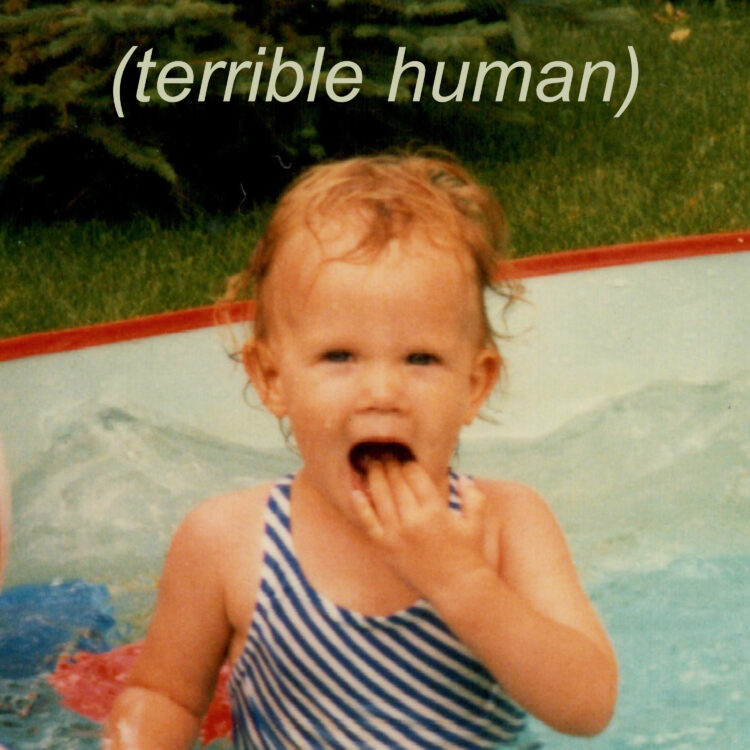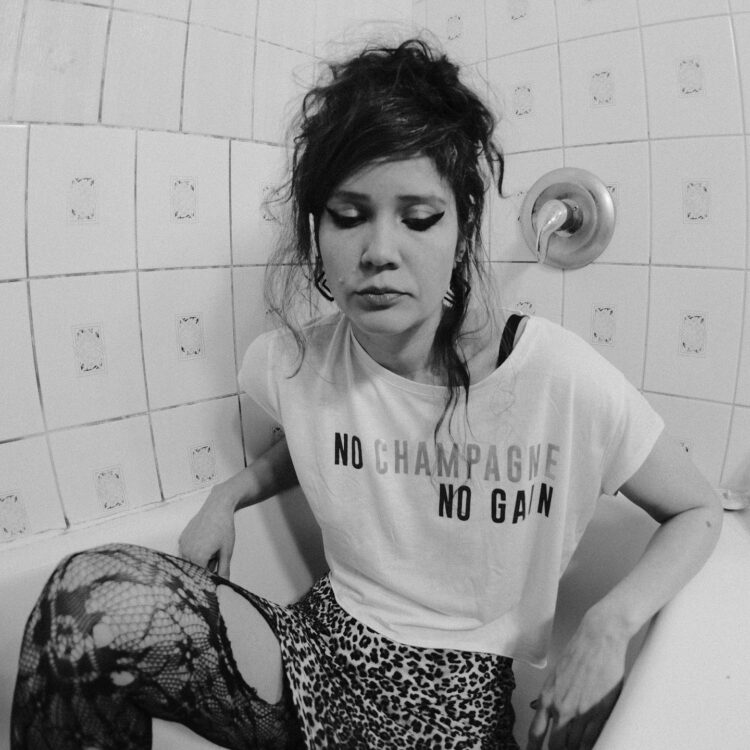
By Jim Barber
An exercise in critical self-examination coupled with a keen observer’s exposition of the human condition at street level, talented Toronto-based singer/songwriter/instrumentalist Vivienne Wilder’s new album Terrible Human is a musical panoply that seamlessly shifts moods, points of view and setting for a memorable and evocative aural experience.
There is elegant literacy to the songcraft, both musically and lyrically, but Wilder’s proficiency with these two languages is belied by the scrappy, frenetic, straight-off-the-floor intensity and deliberately low-fi ethos that permeates the production on Terrible Human. The discerning listener will undoubtedly be impressed by the delightful precision in the playing, the complex vocal characterizations, and overall compositional efficacy of each of the record’s 11 tracks.
Oh, and they’re also infectious, highly listenable, and super fun too!
From the bodacious, brash and unavoidably badass opening track ‘Sex Machine,’ working alongside collaborator/producer Ian Docherty (Dwayne Gretzky, July Talk) Terrible Human takes the listener through a cast of characters from Wilder’s own life, from those around her, from fiction, and somewhere in between. Each song is a story unto itself but always immersed in believability and reality.
“I am constantly writing and I was starting to feel like I was overdue to finally record some stuff, and then once I decided, I spent time curating my choices of which songs fit together in some kind of possibly coherent fashion,” said Wilder, a native of Saskatchewan who is a highly schooled and highly skilled musician, with stints in symphonies, jazz ensembles, punk bands, and a range of esoteric recording projects over the past 15 years as a prolific, well-respected and much in demand member of the Toronto music scene.
“I have a certain voice in my writing so that even if these songs were written many years apart, there can still be a through line connecting them because it’s just the way my brain works. With this new record, for example, I had maybe 20 possibilities that I brought to Ian, who produced and engineered and mixed the record, and we just went with our gut as to which ones we’d work on. Like, ‘this one feels right to do today.’ And the process was kind of governed by that. I just decided to trust that, by following our feelings, it would work out.”
That ‘certain voice’ can be described in many ways. In her own words, Wilder refers to the current style of her music, particularly on Terrible Human, as ‘Bubble Grunge.’
“I think it’s funny, but it’s a real term too. At least for this record it’s a good way of describing the hard, edgier sounds sonically to it, but also that there’s an accessibility where the melodic pieces and vocal hooks and stuff like that brings the ‘bubblegum’ aspect into it. And that’s sort of like the 1990s. I think Smashing Pumpkins was like that and Courtney Love with her more glossier stuff. But on top of that the things that they’re singing about are really sometimes dark and frightening,” she said.
A replay of her discography, from her 2012 self-titled, folk-centered debut EP, through the rock stylings of 2017’s Waking Up the Dinosaurs, the 2020 EP postromantic, through to 2022’s exceptionally raw and revelatory I Don’t Believe, bears witness to a true evolution of Wilder’s song creation prowess and the human/artist behind it. Terrible Human sees her exhibiting an effusive honesty and authenticity as she inhabits the ‘characters’ behind each song – especially when that character is in whole, or in part, herself.
Vocally, again, an evolution has taken place as experience and confidence has transformed Wilder into a more dynamic singer who possesses a ragged elegance in tone, and theatricality of delivery that is, at times, quite film noir in nature.

“I don’t even sound like the same person to myself at all. I was pretty late in the game as a songwriter and as a singer [she had been playing in bands as a popular bassist/background vocalist for hire for a number of years]. So that 2012 EP was my first time singing lead to anything. I know I have come a long way since then, just physically being able to sing louder and project my voice in different ways and getting to know my own voice and accepting its flaws but also sometimes playing up those flaws, which is really fun, actually,” Wilder explained.
“It’s also partially getting a lot of help from Ian too. He will be sitting there when we’re doing vocal takes and he will say, ‘I really liked the direction you went with this one. Let’s keep trying that.’ I think the feedback back and forth with another person that you trust is really helpful. There’s a lot of playfulness in the way I am doing the voices and also in the way Ian’s playing with how he recorded them too.”
Musically, it’s hard to escape the aforementioned deliberately unaffected vibe and unwavering uniqueness to each song. It is a reminder of Wilder’s varied musical pedigree, but also her penchant for the free-form nature of punk rock – one school of punk in particular. The masterfulness of the playing, the cleverness and deceptive complexity of the lyrical storytelling, enveloped in the rawness of the performance makes one think more of the East Village NYC, CBGB’s, Blondie, Talking Heads, Andy Warhol, Velvet Underground sound as opposed to the raw, simplistic chaos of The Sex Pistols or The Damned. The poetic musings of the likes of Lou Reed and Patti Smith were as boldly literate as the music was anarchic at times, but the observations of life, love, lust were as compelling as they were nihilistic. In this sense, Wilder’s work is way more Debbie Harry than it is Johnny Rotten.
“I do love all of those 1970s New York bands a lot. When I first started listening to those bands it was a very formative period in my life, sort of late high school. And I don’t even know how or why I discovered it, they must have been reissued on CD or something,” she said, adding that words have always been important to her compositions.
“I definitely spent a lot of time, possibly too much time, fiddling with lyrics. And I’ve always enjoyed that part of someone like Patti Smith. I am not even the hugest fan of her music, but her ethos and the way she talks about creativity and reading her poetry and understanding the whole story of her adventures in the early days of that scene – I love that stuff.”
Artists of all types, and especially songwriters, are known to use the creative process to unburden themselves from the pain of some ancient wound, recent heartbreak, redress a wrong, or reflect on the consequences of a youthful (or not so youthful) indiscretion. It’s a chance to ‘get real’ with themselves or put out in the world as a cautionary tale to those who hear the songs and take them to heart.
And a lot of this self-evaluation and occasional recrimination is happening with Wilder on this new album. Terrible Human relates back to much of what’s been mentioned above but measured along a sliding scale of closeness to the autobiographical truth. Perhaps in her worst moments, after a really bad day, Wilder may see herself as a ‘terrible person,’ but the songs on the album talk more about the characters that populate them – some of which are, yes, based on her own faults and foibles, some on those of people she knows, some completely invented, or an amalgam thereof.
There is a definite ‘fly on the wall’ feel to some of the compositions, as if we’re hearing private thoughts, witnessing private deeds and experiencing the uncomfortableness that arises when we see someone in pain, in sadness, or mired in regret – or just hungover and ruing a couple of misplaced decisions from the evening before.
“When I looked back at the songs that ended up being selected for the record, I realized that a lot of them were coming from a sort of self-effacing place – where I’m being highly critical of myself. Or were times when I was exploring regret or things that I thought were mistakes or even just hard, hard moments in life. So, I guess that’s what connects them all. And interestingly some of the songs are probably written, at least in part, maybe 10 years ago or more at this point. But they never found a home on another record,” she said.
“I think once I heard them all together and really looked at it, it’s like ‘okay, well it’s not exactly what I would describe as an overall positive feeling as far as the lyrics and tone go,’ but I think it’s ultimately positive in that the songs are exploring these ideas and trying to make sense of them in almost a therapeutic, self-awareness way.”
Wilder does see the value in using her creativity – which is seemingly irrepressible, yet focused, schooled and dynamic – as a way of processing the world, the day-to-day challenges and joys of life, in order to release some of the psychological and emotional shackles from her soul.

“I think it was maybe Amanda Palmer who brought up the notion that every artist is on this spectrum of one to 10, where one is no filter [on what they are saying through their art] and it is very confessional, where I am literally going to sing about something that happened to me and this is the real story, versus someone on the other end of the spectrum where it’s a highly filtered, highly processed side of the art, which I see as like high fantasy – writing using characters and fictitious settings. A lot of rock and roll lyrics and punk lyrics and the whole grunge thing was people externalizing all the things that you’re feeling in real time, and that was freeing for me,” she explained.
“Ultimately, for many artists, including me, even if I did have some filters on, the writing comes from a place of your own experiences and your own perceptions about being alive and you just can’t help it. I think for this album I am, on average, in the middle where some songs are literally me and some of them are very much me singing in someone else’s voice. But even there I think it’s all still part of this therapeutic idea of working through stuff. I also really like that different people can listen to the same song and get something totally different out of it.
“And in a way, I’ve found that it’s really helped me. Something that I now enjoy, since I have been doing this for a while I will notice that I still write about certain things versus things that I’ve moved on from. When I realize I am writing about something again and again I’m like, ‘oh man, it’s really time to let that go.’ It’s having the mirror of this process available to me to help me notice my own patterns and be able to say, ‘come on, you’ve written about that enough. Let’s do something else now.’ So, it’s kind of fun and useful in that way. And, honestly, if these songs were 100 per cent me, I don’t know if I would actually have had the wherewithal to complete a record and get it out into the world.”
As well as a tremendously gifted musician, performer and songwriter, Wilder also uses the vehicle of visual art as yet another form of self-expression, preferring the medium of collage. And, to paraphrase the legendary Canadian philosopher Marshall McLuhan, there is a message in that medium (or media!) that fits with her songwriting philosophy of drawing from a broader palette of life experiences. Not only do her remarkably vivid and powerful collages help soothe her restlessly creative soul, but are also often used in her album art.
“It’s sort of a Frankenstein’s monster. I’ll draw in different references from other people I know, or maybe something I’m reading or another song that I like or what’s on the news and piece things together. I like all visual art, but I really love doing collage for some reason. And I think I kind of use the same logic a lot of the time when I’m writing lyrics – that sort of free association thing, where I am pulling in ideas that may have come from lots of different places,” Wilder said.
The partnership with Docherty led to one of Wilder’s first co-writes on a solo album with her producer, the song ‘Total Mess,’ which does yeoman’s work manifesting the overall vibe of the album.
“Ian came up with the instrumental track for the song and [drummer] Adam Hindle [also of Dwayne Gretzky] helped out by making up these crazy drum beats that also informed what I ended up putting on lyrically and melodically. I happened to have a lyric that I was already sort of messing around with but wasn’t completely satisfied with, but I liked where things were going,” she said.
“Then it just snapped together with what Ian did. So, it was really validating because I’m really happy with how that song came out and it definitely wouldn’t have happened if it were just me, in my typical environment, which is by myself in my room, trying to do everything myself.”
‘Wrong Hero’ is one of the most powerful tracks on the album, mostly because of the exceptionally evocative, stripped-down vocal performance from Wilder.
“Wrong Hero is one of the oldest songs. I wrote it for a different band originally a long time ago. At the time it was more of an electronica kind of thing. So, when that band ended the song kind of languished, but I always loved it, but at the same time, I never felt good about the lyrics. It always felt unfinished. And it also never fit in with my solo band because we didn’t have any synthesizers and it was mostly like rock and punky stuff that we did, and it didn’t even fit with the country and folk stuff I do from time to time. There was just nowhere I felt this song could live,” she said.
“Once we decided to start using more synthesizers in the live show, I realized that now this song was doable, and since I already had a soft spot for it, I ended up just sitting down in the studio when Ian was editing the vocal take or something on another song and just finished the lyrics randomly really quickly. I was like, ‘oh, it’s done. It only took 10 years, but it’s finally done.’ I am really proud of that one, and it’s very emotional for me to sing. Although it took such a long, ridiculous process to get it done, it’s maybe one of the simplest songs on the record.”
A similarly long journey finally saw the psychedelia-tinged ‘Rust Woman’ finally fall into place.
“I really had to chisel away at that for a while. It went through many different versions before this one. It used to be more of a punk song where I was playing a pretty fast strumming guitar part and that’s initially how we tried to do it in the studio, but it changed into what it is now, which is very synth heavy, with lots of trippy soundscapes. Lyrically, it’s really just an exploration of being with someone who is really depressed.”

Contrast this with the Sex and the City-like inferences of ‘Take Out,’ which, depending on the mindset (and possibly relationship status) of the listener, can take one down some interesting possible narrative pathways.
“That one is me with the filter fully at 10, so it’s not me. Everyone asks me why it’s called ‘Take Out’ and I tell them it’s about someone bringing takeout food to their friend’s house, cuz they got shit to talk about. But I am really not going to say much more about what it’s actually about because that’ll ruin it. Sometimes I think it’s fun to write about something really, really specific, but change all the words to hide what the story actually is. Essentially, it’s about somebody who is trying to get someone back – but I’ll leave it there.”
‘Natural Born Quitter’ is another one of the least autobiographical ones on Terrible Human (according to the Palmer scale), but is perfectly apt for the weird, wacky, and wasteful world we all currently share.
“That was one where I came up with the overly clever title first, based on the [1990s Woody Harrelson/Juliette Lewis cult film] Natural Born Killers. And it was written out of frustration, probably from Facebook. I try not to spend too much time on Facebook anymore, so there was a time when I was weaning myself off because it just seemed like nothing good would happen to me if I spent much time there. But then I would break down and be curious and just scroll and see what people are writing and seeing the paranoia and the weird tone that pervades there. That’s what really got the song going. And then I brought it some more personal details and some oddly specific things to make it more relatable for me to sing,” Wilder said.
“So that one’s definitely about a character. I’m actually worried because I am not sure people will understand that it is a character and not me.”
What people won’t have to worry about is Vivienne wilder slowing down any time soon. Besides lining up gigs and doing press to promote Terrible Human, she continues to work dates with a host of artists from across the musical spectrum, including folk artist Abigail Lapell, and alt-rocker Joan Smith from Joan Smith and the Jane Does. She is also in the bands Nick and the Narcs with Nicol Robertson, plays in a 2000s cover act called The 99s, plays alongside folk singer Jon Brooks and does a lot of freelance corporate and studio work.
“A lot of it is pretty random, but when studio stuff comes up, it’s lovely. And I still get to do the odd classical music gig on the upright bass, which I love,” she said.
For more information on Vivienne Wilder and Terrible Human, visit https://viviennewilder.com.
- Jim Barber is a veteran award-winning journalist and author based in Napanee, ON, who has been writing about music and musicians for more than 30 years. Besides his journalistic endeavours, he works as a communications and marketing specialist, and is an avid volunteer in his community. Contact him at jimbarberwritingservices@gmail.com.
